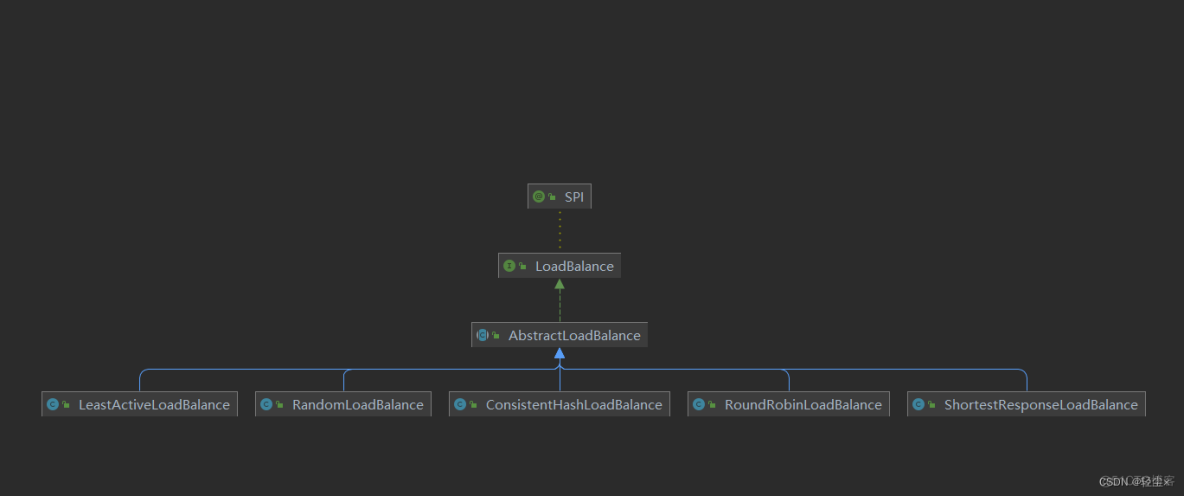

dubbo的负载均衡策略之RandomLoadBalance加权随机策略源码分析
source link: https://blog.51cto.com/u_15696939/5663064
Go to the source link to view the article. You can view the picture content, updated content and better typesetting reading experience. If the link is broken, please click the button below to view the snapshot at that time.

现在先分析最简单的加权平均策略——RandomLoadBalance
/*
* Licensed to the Apache Software Foundation (ASF) under one or more
* contributor license agreements. See the NOTICE file distributed with
* this work for additional information regarding copyright ownership.
* The ASF licenses this file to You under the Apache License, Version 2.0
* (the "License"); you may not use this file except in compliance with
* the License. You may obtain a copy of the License at
*
* http://www.apache.org/licenses/LICENSE-2.0
*
* Unless required by applicable law or agreed to in writing, software
* distributed under the License is distributed on an "AS IS" BASIS,
* WITHOUT WARRANTIES OR CONDITIONS OF ANY KIND, either express or implied.
* See the License for the specific language governing permissions and
* limitations under the License.
*/
package org.apache.dubbo.rpc.cluster.loadbalance;
import org.apache.dubbo.common.URL;
import org.apache.dubbo.rpc.Invocation;
import org.apache.dubbo.rpc.Invoker;
import java.util.List;
import java.util.concurrent.ThreadLocalRandom;
/**
* This class select one provider from multiple providers randomly.
* You can define weights for each provider:
* If the weights are all the same then it will use random.nextInt(number of invokers).
* If the weights are different then it will use random.nextInt(w1 + w2 + ... + wn)
* Note that if the performance of the machine is better than others, you can set a larger weight.
* If the performance is not so good, you can set a smaller weight.
*/
public class RandomLoadBalance extends AbstractLoadBalance {
public static final String NAME = "random";
/**
* Select one invoker between a list using a random criteria
* @param invokers List of possible invokers
* @param url URL
* @param invocation Invocation
* @param <T>
* @return The selected invoker
*/
@Override
protected <T> Invoker<T> doSelect(List<Invoker<T>> invokers, URL url, Invocation invocation) {
// Number of invokers
int length = invokers.size();
// Every invoker has the same weight?
boolean sameWeight = true;
// the maxWeight of every invokers, the minWeight = 0 or the maxWeight of the last invoker
int[] weights = new int[length];
// The sum of weights
int totalWeight = 0;
for (int i = 0; i < length; i++) {
int weight = getWeight(invokers.get(i), invocation);
// Sum
totalWeight += weight;
// save for later use
weights[i] = totalWeight;
if (sameWeight && totalWeight != weight * (i + 1)) {
sameWeight = false;
}
}
// 带权重的随机算法
if (totalWeight > 0 && !sameWeight) {
// If (not every invoker has the same weight & at least one invoker's weight>0), select randomly based on totalWeight.
// 如果权重之和大于0,且权重不一样,就将权重之和作为产生随机数的bound
int offset = ThreadLocalRandom.current().nextInt(totalWeight);
// Return a invoker based on the random value.
for (int i = 0; i < length; i++) {
if (offset < weights[i]) {// 权重越大,越容易被取到
return invokers.get(i);
}
}
}
// If all invokers have the same weight value or totalWeight=0, return evenly.
// 如果没设置权重,或者权重相同,就随机返回一个服务提供者
return invokers.get(ThreadLocalRandom.current().nextInt(length));
}
}
Recommend
About Joyk
Aggregate valuable and interesting links.
Joyk means Joy of geeK